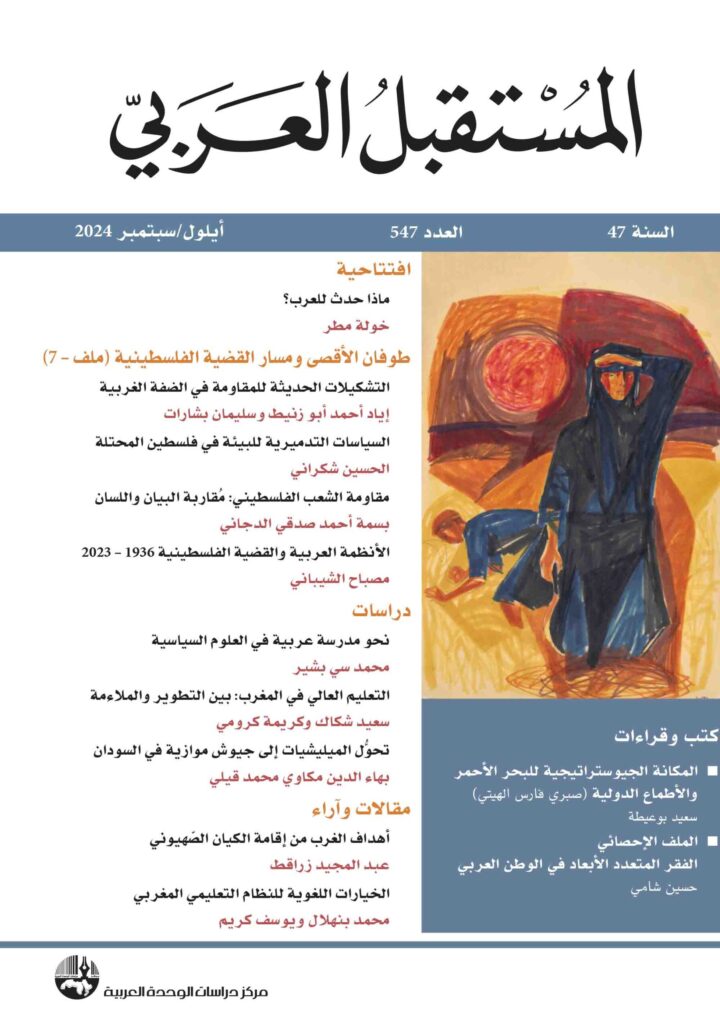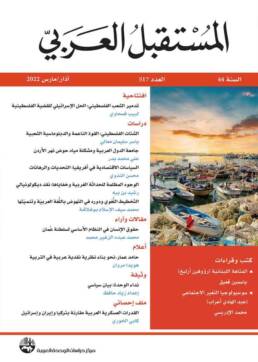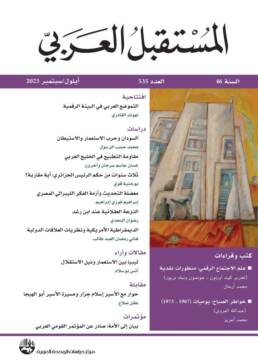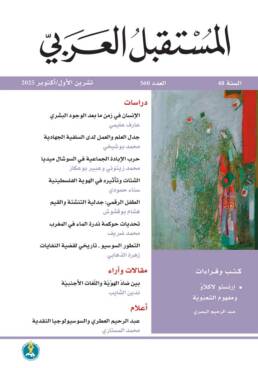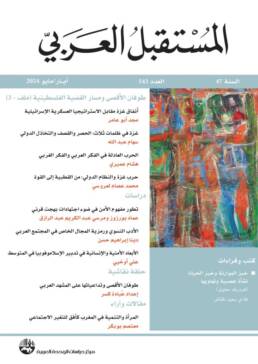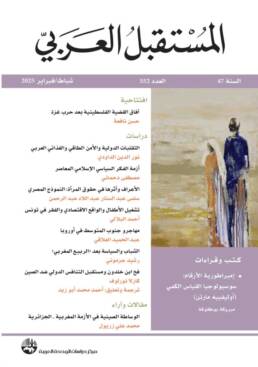Editorial
What happened to the Arabs? Khawla Matar 7
Al-Aqsa Flood and the Palestinian Cause Path (File – 7)
Contemporary Resistance formation in the West Bank:
Between Jenin’s Brigade and the Lion’s Den Eiad Ahmed Abu Zanit and Suleiman Basharat 11
This study aims to identify the patterns of change in contemporary resistance formation in the West Bank, focusing on «Jenin Brigade» and the «Lion’s Den». The study suggests that there are signs of transformation in Palestinian activism that have produced new patterns of resistance, influenced by the Palestinian environment, Israeli policies, and the success of such contemporary patterns influencing Palestinian activism. The study hypothesizes that Palestinian activism is undergoing a maturation phase, which inturn led to the maturation of Palestinian resistance that is strongly tied to ideological transcendence thought. The study concludes that there is a growth in resistance in the West Bank and an Israeli failure to subdue the new Palestinian identity.
Keywords: Jenin Brigade, Lions’ Den, Occupation, Oppression, Subjugation, Social Engineering, Al-Aqsa Flood.
Destructive Israeli Occupation Policies and the Environmental
Dilemma in Palestine Hussein Shakrani 25
This study explores the potentials of employing the Anthropocene concept which is derived from natural sciences in international relations and international law to address the Palestinian situation. It argues that Israel possesses political power, economic resources, and destructive military capabilities that allows it to exert dominance and marginalize the Palestinians. To ensure the success of its apartheid policies, Israel targets the foundations of Palestinian production, undermining Palestinian gains, and reinforcing its military presence on Palestinian territory. The study analyzes elements of subjugation and displacement under Israeli Anthropocene policies that are exerted on Palestinians. It also examines how Israeli policies receive support from Western countries to dismantle the Palestinian community, stripping them of their identity, isolating and displacing them.
Keywords: Anthropocene, Displacement, Environment, Israeli Occupation Authority, Palestinian Cause.
The Arabic Palestinian Resistance to Zionism: A Comparative Analysis
of Discourse and Language Basmah Ahmed Sidqi Al-Dajani 43
For over ten months, actions have given voice to previously silent mouths, and global media channels have once again highlighted the struggles that Palestinian endure under Zionist occupation. Despite the suffering that the Palestinians had to endure for over a century, the »Al-Aqsa Flood» came to relieve Al-Aqsa, revealing the collective genocide as witnessed by all through real-life testimonials. The »Al-Aqsa Flood» has exposed the true nature of Zionism, as embodying imperialistic power through military control to maintain economic gains in this vital region at the center of the world.
Keywords: Zionism, Al-Aqsa Flood, Discourse, Language, Literary Production, European Colonialism, Balfour Declaration.
Arab Regimes and the Palestinian Cause: From the 1936 Revolt to
»Al-Aqsa Flood» Battle Misbah Al-Shibani 61
Following the announcement of Balfour Declaration (1917), the Zionist movement established a clear strategic plan to Judaize Palestine and build its settlement and imperial project in the Arab region through means of both hard and soft power, including political propaganda, deceitful tactics, and religious myths. To achieve its goals of securing Palestine and displacing its people, the Zionist movement allied with certain Arabic regimes both before and after the declaration of the »State of Israel.» Since the 1920s, various projects and initiatives have been proposed to facilitate the Zionist project in Palestine and eliminate all forms of resistance. These Arab regimes have campaigned to mobilize the Arab masses to accept settlement plans with the Zionist enemy and to peacefully coexist with it.
Keywords: Zionist Movement, Political Chronology, Arab Betrayal, Al-Aqsa Flood Battle.
Studies
Towards an Arab School in Political Science Mohammed S. Bashir 81
In its effort to adapt to the changes witnessed in the Arab world during what is known as the Arab Spring, Political science has developed new research mechanisms to describe and analyze such phenomena. The deep connection with the Arab environment has led for the reassessment of concepts with regards to their new meanings, and for approaches to be adapted to this unique context. The study thus seeks to highlight the necessity of establishing an Arab school of political science that addresses these concepts and develop approaches suited to the Arab context, avoiding inappropriate application of research tools that were developed in different environments that are no longer suitable for the distinct political, social, economic, and research characteristics of the Arab world.
Keywords: Political Science, Arab World, Democracy, Dictatorship, Arab Spring, Revolutions
Higher Education in Morocco: Between Development and
Adaptation Said Chakkak and Karima Kroumi 94
This study aims to reveal the specificities of higher education training and teaching in Morocco and to explore its development through the implemented reforms. It examines the various challenges that impede achieving the development goal in relation to the issue of adaptation and alignment in a sensitive field marked by transformation and fluctuation. The study highlights the role and importance of the university in bringing about a fundamental change that affects the daily lives of graduating students and restores their contributions to building the present and envisioning a shared future within a space undergoing transformation. It is well known that such aspiration may clash with cultural, socio-political, and economic challenges that are difficult to deny. However, experience has demonstrated that the higher education sector plays a central role in achieving the desired sustainable human development.
Keywords: Higher Education, University, Training, Teaching, Development, Recognition.
The Transformation of Government Militias into
Parallel Armies: The Case of the Rapid Support Forces Bahauddin Makkawi Mohammed Qaili 107
This research explains the reasons and consequences of government militias transformation into parallel armies, with a particular focus on the Sudanese Rapid Support Forces. It examines how this militia evolved from a limited local force into a powerful entity parallel to the Sudanese army which has been established for nearly a hundred years. The study analyzes the impact of this transformation on national security, especially after the Rapid Support Forces have engaged in an open war across the country, destroying infrastructure and displacing citizens from their homes. The study reveals the immense capabilities acquired by the Rapid Support Forces in recent years, including advanced weaponry, training, substantial financial resources, as well as regional and international relations and extensive military and economic partnerships with various parties.
Keywords: Rapid Support Forces, Sudanese Army, April War, Sudanese Revolution, Government Militias.
Articles and Opinions
The West’s Objectives in Establishing the Zionist Entity:
The Tool and the Role Abdel Majid Zaraqit 125
Language Choices in the Moroccan Educational System:
The Cracks of Colonialism in the Contemporary Era Mohammed Benhalal and Youssef Karim 135
Books and Reviews
The Geostrategic Importance of the Red Sea and International
Ambitions (by Sabri Fares Al-Hayti) Said Bouaita 143
Book Summeries Gabi Khoury 149
Arabic Books: Israeli Energy Projects in the Eastern Mediterranean and the Arab National Security Challenges; In the Making … The Middle East Between Shifts in the International System and Regional Interactions; Religion and Secularism: An Analytical Study on the Impact of Values on Political Behavior;
The Revolutionary Priest Manuel Musallam: Listen, O Palestine.
Foreign Books: When Politics Meets Religion: Navigating Old Challenges and New Perspectives; Who Owns Democracy? The Real Deep State and the Struggle Over Class and Caste in America; Protecting Democracy in Europe: Pluralism, Autocracy and the Future of the EU; Who Will Defend Europe?: An Awakened Russia and a Sleeping Continent.
Research Reports: Why Iran Will Escalate; A New Era for Turkish-Syrian Ties?
Statistical File
Poverty in Arab Countries Hussein Shami 162
Add a review
You must be logged in to post a review.

